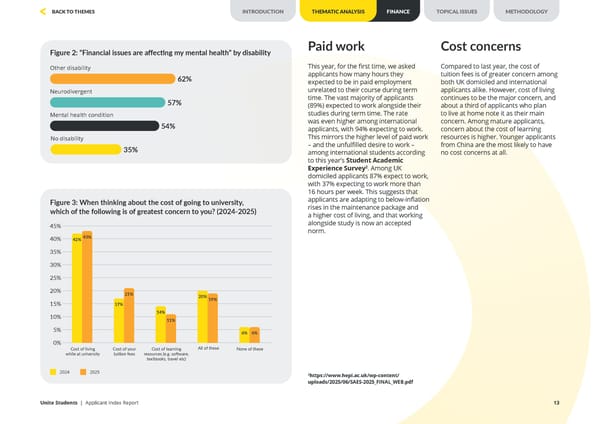Paid work This year, for the first time, we asked applicants how many hours they expected to be in paid employment unrelated to their course during term time. The vast majority of applicants (89%) expected to work alongside their studies during term time. The rate was even higher among international applicants, with 94% expecting to work. This mirrors the higher level of paid work – and the unfulfilled desire to work – among international students according to this year’s Student Academic Experience Survey2. Among UK domiciled applicants 87% expect to work, with 37% expecting to work more than 16 hours per week. This suggests that applicants are adapting to below-inflation rises in the maintenance package and a higher cost of living, and that working alongside study is now an accepted norm. Cost concerns Compared to last year, the cost of tuition fees is of greater concern among both UK domiciled and international applicants alike. However, cost of living continues to be the major concern, and about a third of applicants who plan to live at home note it as their main concern. Among mature applicants, concern about the cost of learning resources is higher. Younger applicants from China are the most likely to have no cost concerns at all. Figure 3: When thinking about the cost of going to university, which of the following is of greatest concern to you? (2024-2025) 2024 2025 Cost of living while at university 40% 35% 30% 25% 20% 15% 10% 5% 0% 45% 42% 43% Cost of your tuition fees 17% 21% Cost of learning resources (e.g. software, textbooks, travel etc) 14% 11% All of these 20% 19% None of these 6% 6% Figure 2: “Financial issues are affecting my mental health” by disability 2https://www.hepi.ac.uk/wp-content/ uploads/2025/06/SAES-2025_FINAL_WEB.pdf Other disability 62% Neurodivergent 57% Mental health condition 54% No disability 35% Unite Students | Applicant Index Report 13 INTRODUCTION THEMATIC ANALYSIS FINANCE METHODOLOGY TOPICAL ISSUES BACK TO THEMES
 Unite Students Applicant Index - 2025 Page 12 Page 14
Unite Students Applicant Index - 2025 Page 12 Page 14